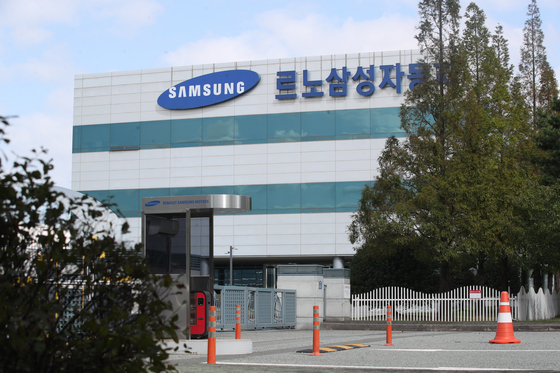![View of Renault Samsung's Busan plant. [뉴스1]](https://i0.wp.com/pds.joins.com/news/component/htmlphoto_mmdata/202103/10/a69de65a-47e3-4d02-9121-589d9c056c13.jpg?w=560&ssl=1)
View of Renault Samsung’s Busan plant. [뉴스1]
Renault Samsung proposed to the union a plan to reduce the existing two-shift work to one shift in the wage and collective bargaining agreement in 2020. Since the production volume of the Busan plant has decreased compared to the previous year, the purpose is to operate the production line only during the day. The union is holding tents and is opposed to management proposals.
Labor-management conflict over the transition to’one shift work’
On the 10th, both sides of Renault Samsung’s labor and management attended the’Conference for Normalization of Renault Samsung Motors’ held at the Busan City Council. It is reported that Busan City, Busan City Council, and Busan Regional Labor Office participated to discuss the formation of a labor-management meeting for the rehabilitation of Renault Samsung, which has a large proportion of the local economy.
On the 9th, the day before, Renault Samsung held the eighth main negotiations with the Employment Stability Committee in which labor and management representatives participated, but the negotiations were completed without income. Renault Samsung’s management recently asked the union to “switch the day and night two shifts to one weekly shift starting on the 15th.” One shift is a system in which only one weekly group is not operated separately for day and night ‘8 hours working, 2 groups’ like a general automobile factory. Originally, the Renault Samsung Busan factory was operated with a daytime group working from 7 am to 3:45 pm and a night class working from 3:45 pm to 12:30 pm.
In the automobile industry, Renault Samsung’s proposal is regarded as a kind of pressure. This is because the’one shift’ system itself is a method of choosing just before the factory closes. GM Korea’s old Gunsan plant operated only in one shift until immediately before withdrawal in 2018. Renault Samsung is in the position of “an inevitable choice due to a decrease in production volume” regarding this measure. The production of Renault Samsung’s Busan plant with an annual output of 300,000 units last year was only 112171 units, down 34.5% from 2019. According to the company, this is the lowest in the last five years.
Union tent formation “pass over deficit responsibility”
Dominic Signora, president of Renault Samsung, said in a bargaining agreement last month that “this year’s production is expected to decrease from the original estimate of 157,000 units to about 100,000 units.” The company’s management also suggested, “If it is difficult to change one shift, how about increasing the hourly output (UPH) from 45 to 60, and introducing a ‘4 days a week’ instead?” In the case of introducing 4-day work a week, production workers will have one day of unpaid holidays per week (holidays for which they are not paid). It is reported that about 500 people have responded to the hopeful retirement that Renault Samsung has conducted for all employees (about 4,100) until recently.
![The metal union Renault Samsung Motors has been building tents since the 7th. [사진 금속노조 르노삼성차지회]](https://i0.wp.com/pds.joins.com/news/component/htmlphoto_mmdata/202103/10/56075604-4374-4a63-8296-e6c9e9b63a8a.jpg?w=560&ssl=1)
The metal union Renault Samsung Motors has been building tents since the 7th. [사진 금속노조 르노삼성차지회]
Renault Samsung’s retirement from the metallurgical union said, “We have already left many of our colleagues because of their hoped retirement. We should not leave the responsibility for management failures to employees only.” Starting this week, it has entered the tent building in the Busan factory. Renault Samsung’s union could go on strike at any time because it won a majority vote in the industrial action vote last month.
Reporter Kim Young-min [email protected]
![]()
